By Beti Baiye and Ibukun Oguntola (Lead Writers)
The media plays a significant role in how the public responds to health issues. Mass media, print, television, radio and internet have considerable power, reaching a wide and diverse audience, raising awareness about issues, framing how we think about issues and what we should be concerned about. The media also has an important role to play in reporting epidemics.
Health in the News
Before the Ebola outbreak and most recently, the COVID-19 pandemic, health security was not topical news. When there is no emergency, health news barely makes the front page. In a media roundtable with journalists from notable media houses in Lagos in 2019, the journalists present revealed that media houses focus on news that sells, which is usually politics, finance, entertainment or sports.
In 2014, health made the front page. As a result of the Ebola outbreak, the Nigerian media was agog with information, providing up-to-date data on the government’s response, educating the public and helping to alleviate panic and address misinformation. A classic example of misinformation was the rumour that bathing with, or ingesting salt could cure Ebola. News reports tracked it to a text message from a student in Nigeria and in a few days, the rumour was quashed across traditional and social media.
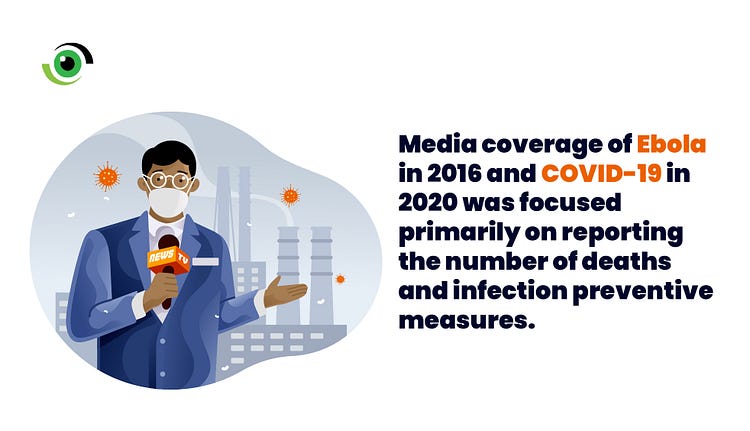
An analysis of research studies published on the coverage of the Ebola outbreak, and COVID-19 pandemic revealed that a large proportion of media story themes were focused on reporting the number of cases, deaths and general infection preventive measures. This is commendable as the important role the media plays in reporting epidemics cannot be over emphasised. However, the media needs to go beyond reporting on the response to an outbreak to discussing what must be done to prepare for the next outbreak.
Advocating for Epidemic Preparedness
Pandemics are not random. While this may not be the earliest mention of the subject, in 2005, Dr Fauci wrote an article titled, “Emerging and Reemerging Infectious Diseases: The Perpetual Challenge” where he discussed the significant challenges presented by infectious diseases as new microbial threats emerge and reemerge. Today we know that new infectious diseases emerge, and old diseases re-emerge in new areas, so, COVID-19 will not be the last disease outbreak that the world faces. The media therefore has a role to play in driving public and policymaker awareness on the need for epidemic preparedness as part of the response to any infectious disease outbreak.
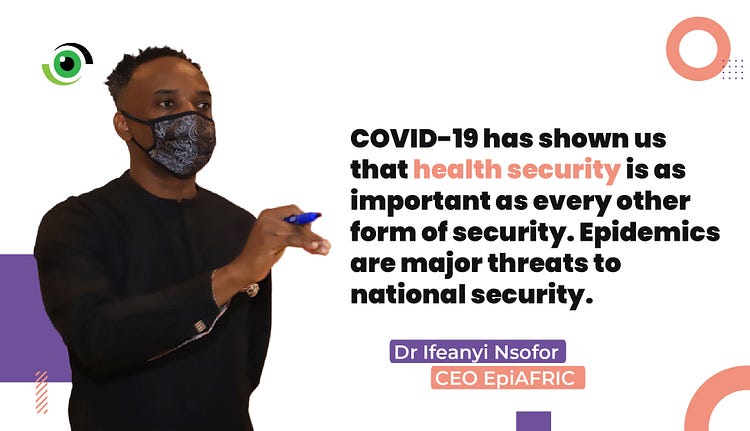
When Nigeria Health Watch’s (NHW) #PreventEpidemicsNaija project launched in October 2018 and began advocating for increased funding for epidemic preparedness in Nigeria, sceptics may have thought that it was akin to the case of the boy who cried wolf. With the various pressing health needs that required urgent attention, why should the country dedicate resources to prepare for an epidemic that might not happen? But it seems now the project was future-facing.
Media engagement is a core part of this project and Nigeria Health Watch has consistently engaged with journalists in a bid to empower the media to produce stories that focus on the need to prepare for epidemics even before they occur.
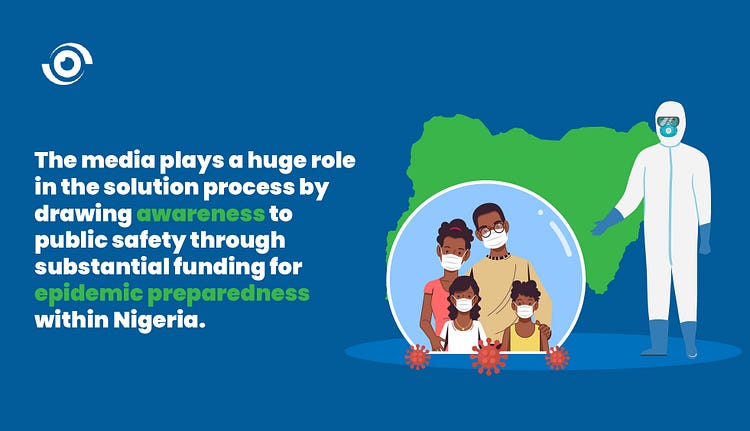
July 1st, 2021, the #PreventEpidemicsNaija project hosted a small group of journalists for a masterclass themed: Positioning Epidemic Preparedness Funding as a Public Health Priority. The masterclass focused on helping the participants understand the importance of writing about epidemic preparedness and response, as well as reporting on epidemics, and how journalists can include components of epidemic preparedness that advocate for stable and sustained funding for epidemic preparedness in their articles. Investment in preparedness is cost effective compared to the high costs of responding to an epidemic, but domestic investments in epidemic preparedness has been consistently low.
One key takeaway from the masterclass was that the media must promote the need for deliberate and sustained investment in Nigeria’s health security as sustained and substantial funding is the main driver of preparedness for future epidemics. Funding is key and the media must use its reach to advocate for Nigeria to strengthen its disease prevention capacities by providing sustained funding for epidemic preparedness. Beyond health, the social and economic ramifications of COVID-19 have been extensive and severe thus, the media must not only advocate for more funding for epidemic preparedness, but also push health security up the political agenda, giving it the same focused reporting that other security issues in the country receive. This is critical to protect the social and economic stability of the country.
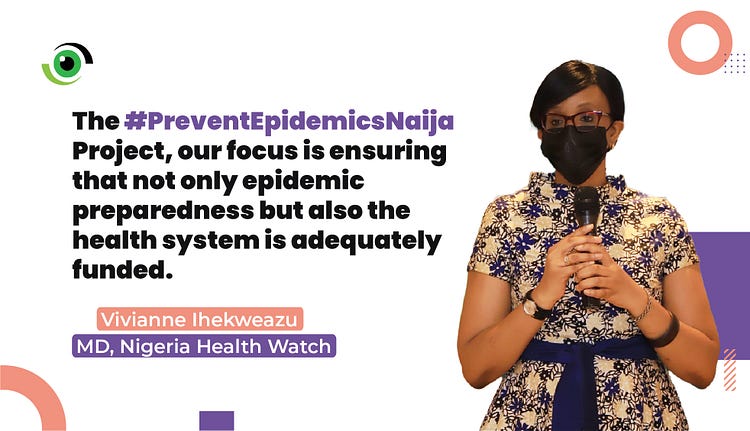
#PreventEpidemicsNaija Journalism Award
The #PreventEpidemicsNaija project is funded by the Global Health Advocacy Incubator (GHAI), a program of the Campaign for Tobacco Free Kids” and “Vital Strategies” and in 2020, the project, as part of its commitment to strengthening reportage around epidemic preparedness, announced the first edition of the #PreventEpidemicsNaija Journalism Award. At the ceremony, four journalists were celebrated for their outstanding reportage on raising awareness on epidemic preparedness and disease outbreaks in Nigeria. In a few months, we will open nominations for the 2021 edition of the awards, and we look forward to receiving entries from eligible journalists who have been intentional about going beyond reporting on the response to advocating for better preparedness.
What the Media Should do
The media played a critical role in providing up-to-date information about COVID-19 and Nigeria’s response to the pandemic as newsrooms across the country made pandemic coverage a priority. This momentum should be sustained, and every opportunity taken to report on and highlight Nigeria’s ability to respond to and prepare for future infectious disease threats, if adequately funded.
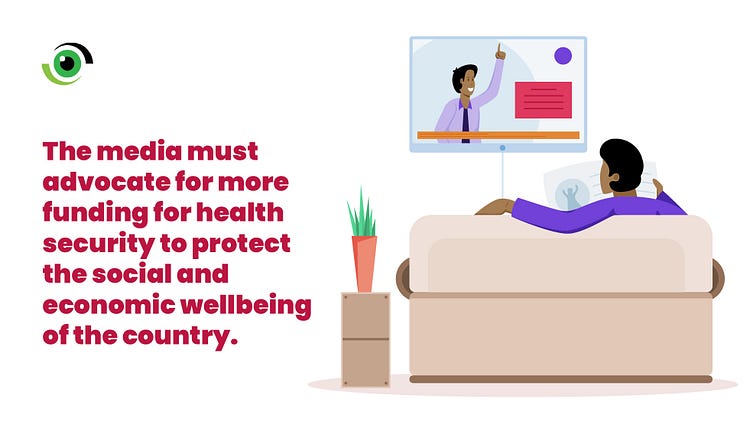
Future epidemics could surpass previous outbreaks and the media can be part of the solution by constantly reminding us that our safety is guaranteed only when the government, policymakers and other relevant stakeholders provide sustained and substantial funding for epidemic preparedness in Nigeria.


